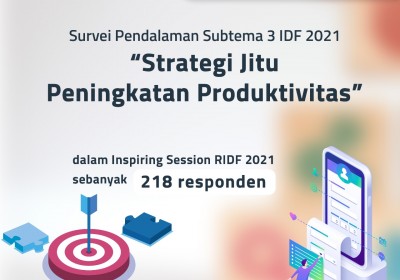Productivity Growth Must Be Accompanied By Efforts to Improve Human Resource Quality
August 23, 2021
JAKARTA – The Ministry of National Development Planning/Bappenas, through the Indonesia Development Forum (IDF), held several online surveys geared towards the participants of the IDF's Inspiring Session Road to IDF webinars on Tuesday (29/6).
Up to 218 respondents took part in the survey, spread across Indonesia, ranging from government employees, academics, and private sector employees to students, entrepreneurs and housewives. Their responses confirmed the importance of effective industrialization strategies that focus on improving the competitiveness of Indonesia's industrial subsectors.
The survey's theme revolved around one of the IDF's 5 subthemes, namely theme 3: "Effective Strategies in Improving Productivity and consisted of 5 questions. The conclusion of this survey suggested that increasing productivity does not only involve improving technological adaptation, but also needs to be accompanied by the development of manpower. Human resource development is driven by industries that are enables technology.
A total of 36.7% of respondents believe that the low utilization of technology, research & development and innovation is the most inhibiting factor of growth for Indonesia's industrial sectors. Another 31.2% believe that the root of the problem lies in the quality of human resources, which is reflected in the high proportion of workers in the informal sector, the majority of whom have low quality skills and type of work.
Based on a 2017 study by the Ministry of National Development Planning/Bappenas, the low quality of Indonesia's human resources presents an obstacle for future economic growth, especially in the face of industry 4.0 and digital economy growth.
In line with these findings, one of the strategies outlined in the Indonesian government's 2020-2024 Mid-Term Working Plan (RPJMN) is to increase the productivity, education and quality of human resources. This strategy is directed at reforming vocational education teaching and training systems based on industrial cooperation. In this regard, more than half of the total respondents think that the importance of the education system and preparation of the workforce should not only be focused on improving technical abilities (hard skills), but also on improving soft skills such as knowledge depth and behavioral skills. At the same time, the government, together with the business and industrial worlds, are expected to continue encouraging the improvement of workers' skills through their own efforts to upskill and reskill their workforce to bolster productivity in a sustainable manner. This collaboration is also needed to respond to the post-Covid-19 challenges related to accelerating automation and digitalization, changing global supply chain patterns and the effective implementation of ecofriendly recovery policies.
Another challenge is the low capacity for adopting science and technology, as well as the lack of innovation, in the industrial sector. Based on the Global Innovation Index (GII), Indonesia is ranked 85th out of 129 countries. Research & Development spending towards the gross domestic product (GDP) is still very low. The number of science and technology human resources are also still very limited, as only about 14% have doctoral qualifications. In this context, nearly 60% of respondents consider that strengthening triple-helix cooperation (between university/R&D institutions, government institutions and industrial actors) is the main key in tackling these challenges.
Strengthening the innovations ecosystem is an important aspect to be improved upon in order to help develop talents that have gone through the Indonesian education system into productive and innovative members of the workforce who are able to apply technology and are able to contribute to the creation of high added value.
During the IDF's Subtheme 3 Inspiring Session, it was stated that increasing productivity is a journey that faces various waves of change due to ongoing technological advances taking place in the world. Factors that produce the biggest changes in productivity are investment in equipment, technology, research facilities, supply chain optimization and skill training for the workforce.
*****
Indonesia’s Research Institutions Supporting the Development of the Electric Vehicle Industry
Indonesian Muslim Fashion and Cosmetics IKMs Shine at Dubai World Expo 2020
Govt Steps Up UMKM Transformation Efforts in the Midst of Pandemic Slowdown
Govt Encourages Promotion of IKM Products in Digital Era
Government Begins Developing Maritime Training Center in Makassar
Tweets by IDDevForum
